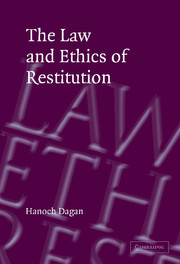Book contents
- Frontmatter
- Contents
- Acknowledgments
- Table of cases
- Table of statutes and treaties
- 1 Introduction
- 2 Preventing unjust enrichment
- 3 Mistakes
- 4 Other-regarding conferrals of benefits
- 5 Self-interested conferrals of benefits
- 6 Restitution in contexts of informal intimacy
- 7 Wrongful enrichments
- 8 Restitution in a contractual context
- 9 Restitution in bankruptcy
- 10 Reasons for restitution
- Bibliography
- Index
3 - Mistakes
Published online by Cambridge University Press: 05 July 2009
- Frontmatter
- Contents
- Acknowledgments
- Table of cases
- Table of statutes and treaties
- 1 Introduction
- 2 Preventing unjust enrichment
- 3 Mistakes
- 4 Other-regarding conferrals of benefits
- 5 Self-interested conferrals of benefits
- 6 Restitution in contexts of informal intimacy
- 7 Wrongful enrichments
- 8 Restitution in a contractual context
- 9 Restitution in bankruptcy
- 10 Reasons for restitution
- Bibliography
- Index
Summary
Mistakes are ubiquitous. On numerous everyday occasions, we are mistaken about facts or law. Many of these mistakes are inconsequential or self-regarding, with no detrimental effect on anyone but the mistaken party. Such mistakes require no legal intervention. Law is invoked, however, when more than one person is involved in the drama.
One such case, outside the scope of this chapter (and of the law of restitution), is mistake in the formation of a contract. A similar type of mistake, also somewhat beside my inquiry here, involves mistakes in dispute settlements. The pertinent rule for such mistakes has been laid down by the first Restatement of Restitution, and is still – as it should be – good law: “A person is not entitled to rescind a transaction with another if, by way of compromise or otherwise, he agreed with the other to assume, or intended to assume, the risk of a mistake for which otherwise he would be entitled to rescission and consequent restitution.” As the draft of the new Restatement explains, if money is paid “in the face of a recognized uncertainty as to the existence or extent of the payor's obligation to the recipient,” it “may not be recovered on the ground of ‘mistake,’ merely because the payment is subsequently revealed to have exceeded the true amount of the underlying obligation.”
- Type
- Chapter
- Information
- The Law and Ethics of Restitution , pp. 37 - 85Publisher: Cambridge University PressPrint publication year: 2004

